Nashville priest becomes the Diocese of Knoxville’s new shepherd
By Dan McWilliams
The smile of a youngster assured Bishop Mark Beckman that everything would be all right as he processed into the historic ordination Mass that would make him the fourth shepherd of the Diocese of Knoxville.
A gathering of 4,000 at the Knoxville Convention Center attended the Mass on July 26, the memorial of Sts. Joachim and Anne, that elevated the longtime Diocese of Nashville priest to bishop of the Church in East Tennessee.
“As I walked into the liturgy this afternoon, down the aisle, I looked to my left, and there was a little girl with a smile on her face waving at me,” Bishop Beckman said at the end of Mass. “The joy in her eyes, the warmth and welcome, that’s what all of us are invited to share in this great Diocese of Knoxville here in East Tennessee. We have a great mission ahead of us.”
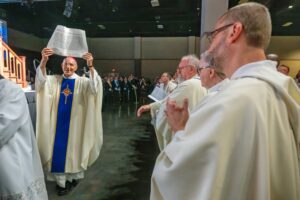
Bishop Mark Beckman holds the papal bull as he processes through the congregation at the Knoxville Convention Center during his Mass of ordination and installation. The document attests that Pope Francis has appointed the former Diocese of Nashville priest as bishop of the Diocese of Knoxville. The exhibition hall was transformed into sacred space for the event. (Photo Tom McNutt / BOPP)
Archbishop Shelton J. Fabre of Louisville, Ky., the province that includes the Knoxville Diocese, was the principal consecrator and the homilist in the ordination. Co-consecrators were Bishop J. Mark Spalding of the Diocese of Nashville and Bishop James V. Johnston Jr. of the Diocese of Kansas City-St. Joseph, Mo. Bishop Johnston is a native of the Diocese of Knoxville. All three bishops were serving as a consecrator for the first time in their episcopacies.
Archbishop Fabre has served as apostolic administrator of the Diocese of Knoxville from the time its see became vacant in June 2023, when Bishop Richard F. Stika retired.
Bishop Beckman, 61, is a native of Lawrenceburg, Tenn., in the Diocese of Nashville and has served as a priest in the Middle Tennessee diocese since his ordination in 1990.
“In His wisdom, God has chosen you, James Mark Beckman, to be bishop in this new season for the Diocese of Knoxville, and relying on the grace of God and the wisdom of the Holy Spirit, you have said ‘yes’ to this call,” Archbishop Fabre said in his homily.
Archbishop Fabre, Bishop Beckman, and Bishop Spalding studied together at The American College at the Catholic University of Louvain in Belgium as young seminarians in the 1980s.
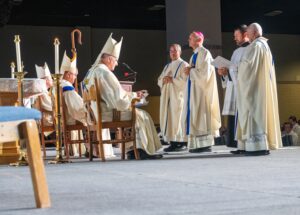
Bishop Beckman, accompanied by Monsignor Al Humbrecht, standing right, and Father Peter Iorio, standing left, gives the Promise of the Elect to Archbishop Fabre, who is seated between Bishop Johnston, right, and Bishop Spalding. (Photo Tom McNutt / BOPP)
“Bishop Beckman, as you undertake your role as the chief shepherd of this diocese, I rejoice with you and with the Diocese of Knoxville,” Archbishop Fabre said. “On a more personal note, who would have thought that from the days of our studying and traveling together during our seminary time at The American College in Belgium, that the Lord would bring us together as brother bishops? I am confident that with the help of God, you will be a good bishop here.”
Bishop Beckman recalled a life-changing phone call.
“At the end of April, when I first was pondering the call of the nuncio to me asking me to become the bishop of the Diocese of Knoxville, there were so many things that went through my heart and mind,” he said at the end of Mass. “One of the things that I remember was the opportunity I had a few years ago to attend the installation of Archbishop Fabre in Louisville, Ky. I hope I do not misquote you, Archbishop, but what I remember him saying the day he was installed as the archbishop of Louisville was a comment that I’ve thought about many times since. He said, ‘This day is about a person, and that person is not me. That person is Jesus Christ.’”
After the assembly applauded, the new bishop continued.
“And this day, too, is about Jesus Christ,” he said.
Nineteen archbishops, bishops, and abbots overall attended the ordination of Bishop Beckman, including Archbishop Emeritus Joseph E. Kurtz of Louisville, who led the Diocese of Knoxville as its second bishop from 1999 to 2007, and Abbot Emeritus Cletus D. Meagher, OSB, of St. Bernard Abbey in Cullman, Ala., a native of Cleveland, Tenn. Making the longest trip was Archbishop Augustine Obiora Akubeze of Benin City, Nigeria.
A total of 138 priests and 65 deacons, most from the Diocese of Knoxville but a good number from the new bishop’s native Nashville Diocese and elsewhere, also were present. Many priest friends of Bishop Beckman from the Diocese of Nashville attended the ordination Mass.
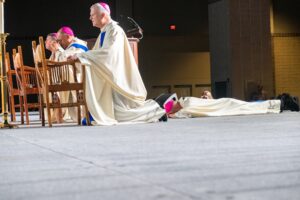
Bishop Mark Beckman lies prostrate during the Litany of the Saints. This act symbolizes his unworthiness for the office he is assuming and his dependence upon God and the prayers of the Christian community. Kneeling in prayer are, right to left, consecrators Bishop James V. Johnston Jr., Archbishop Shelton J. Fabre, and Bishop J. Mark Spalding. (Tom McNutt / BOPP)
Along with the concelebrating bishops, priests of the Diocese of Knoxville who concelebrated were Father David Boettner, Father David Carter, Father Mike Cummins, Father Mike Nolan, Father Doug Owens, Father Joe Reed, and Father Mark Schuster.
Knoxville diocesan priests Monsignor Al Humbrecht and Father Peter Iorio served as assistants to Bishop Beckman during the Mass.
Monsignor Humbrecht and Fathers Boettner, Cummins, Owens, and Reed are diocesan consultors. Fathers Iorio, Nolan, and Schuster are special delegates for their deaneries. Father Carter is judicial vicar for the diocesan tribunal. Father Schuster is the diocesan vocations director. Father Arthur Torres, assistant vocations director, also was in attendance at the ordination.
Deacon Tim Elliott was deacon of the Word, and Deacon A.J. Houston served as deacon of the altar. Deacon Walt Otey, Jerry Bodie, and Jay Coatney were masters of ceremonies. Mary Corby of St. Henry Parish in Nashville proclaimed the first reading and Maria Rios of St. Thomas the Apostle in Lenoir City proclaimed the second reading, the latter in Spanish.
Bishop Beckman’s parents, Jimmy and Lois Beckman, his brother Ben Beckman, and sister Melissa McCawley were gift bearers.
Monsignor John Paul Zenollito Pedrera represented Cardinal Christophe Pierre, apostolic nuncio to the United States, who was unable to attend Bishop Beckman’s ordination. Monsignor Pedrera, first secretary of the Apostolic Nunciature in Washington, D.C., read the mandate from Pope Francis naming Bishop Beckman to his new role as part of the ordination ceremony.
After the mandate was read, the soon-to-be-Bishop Beckman held the document aloft and processed through the convention center exhibition hall so that all present could see it. The hall was converted into a sanctuary and nave for the ordination and installation.
The afternoon began with a one-hour prelude by the diocesan choir and the Tennessee Wind Symphony.
A non-liturgical procession took place about a half-hour before Mass began and included papal honorees, dozens of women and men religious, and members both of the Equestrian Order of the Holy Sepulchre of Jerusalem and the Order of the Fleur de Lis.
The long liturgical procession that opened the Mass began with cross and candle bearers and included the bearers of the bishop-elect’s crosier, miter, and ring; deacons from the dioceses of Knoxville and Nashville; priests from both dioceses and beyond; the consultors; Bishop-elect Beckman and his assistants; abbots, bishops, and the co-consecrators; Monsignor Pedrera; and finally Archbishop Fabre and the vips.
Shepherding his flock
After the opening rites and the readings, the ordination rite began with the presentation of the elect. Monsignor Pedrera read the mandate at that point.
“My dear friends in Christ in the Diocese of Knoxville, it is a great honor for me to be with you today as we celebrate the ordination of Bishop Mark Beckman,” Archbishop Fabre said as he began his homily. “While it has been a grace to walk with you during this last year as your apostolic administrator, each diocese is intended to have a bishop of its own to serve as its leader and pastor. To quote from the Second Vatican Council’s Decree on the Pastoral Office of Bishops, the bishops’ role is to serve “as pastors of souls . . . to continue throughout the ages the work of Christ, the eternal pastor.”
The quote comes from the 1965 decree, Christus Dominus (“Christ the Lord”), paragraph 2.
“The role of the bishop is of supreme importance in the life of a diocese as the bishop continues uniquely the work of Jesus Christ,” the archbishop said. “The image of the bishop as the pastor or shepherd of a diocese has a long and rich history in the life of the Church. Jesus identified Himself as the Good Shepherd who knows the sheep, protects them from wolves, always stands by them, and even lays down His life for them.
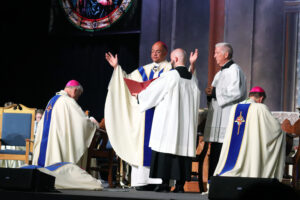
Bishop Mark Beckman lies prostrate as the consecrator, Archbishop Shelton J. Fabre, gives a prayer during the Mass of ordination and installation. Co-consecrators kneeling are, at left, Bishop James V. Johnston Jr., and at right, Bishop J. Mark Spalding. Assisting are seminarian Bobby Denne and Deacon Walt Otey (Photo Gabrielle Nolan)
“Jesus sent His Apostles to continue this work of shepherding the Church after His ascension into heaven. A good shepherd must focus on the flock, which means noticing where the flock is on the journey. Shepherds can attest that sheep do not always move uniformly from one place to another. Individual sheep graze, meander, and move at their own pace. Some even wander off. A good shepherd knows this and lovingly and appropriately attends to the sheep where they are.”
The image of a bishop as a shepherd can take three forms, Archbishop Fabre noted.
“These three ways are: a bishop shepherds the flock from in front of them, a bishop leads the flock from behind them, and a bishop leads the flock in the midst of them,” he said. “No one manner of leading the flock is better than the others, and the circumstances of particular times and challenges may call for a greater emphasis on one or another of these ways of leadership. The mark of a good shepherd is through wisdom and prayer to know when and how to lead the flock using all three of these ways. The Scripture readings chosen for this ordination liturgy each focus on one of these types of leadership and offer excellent insight into how the bishop is called to shepherd the flock.”
The ordination Mass readings, chosen by Bishop Beckman, came from Isaiah 61:1-3a, 2 Corinthians 4:1-2, 5-7, and John 20:19-23.
“In our first reading from the prophet Isaiah, the prophet speaks of the anointing he received from the Lord to be a minister of mercy to those afflicted and brokenhearted, to those held bound and captive in their lives,” Archbishop Fabre continued. “In this, we can see what I shall term the ‘Servant Shepherd,’ which is leadership from behind the flock, offering gentle encouragement to those suffering and who may have given up hope and fallen behind. People can be in places of great struggle and difficulty where it may be hard to hold onto the hope that God is with them, caring for and providing for them. Sadness and grief from loss or the challenges of living can keep many people in places of despair, and the pain of division can cause people to feel isolated and alone.
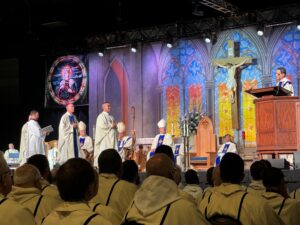
Monsignor John Paul Zenollito Pedrera, representing the papal nuncio, reads the official decree from the Vatican naming Bishop Beckman the fourth shepherd of the Church in East Tennessee. (Photo Will Brewer)
“They need the voice of hope, a shepherd who knows that the dawn will most certainly break through the night. The shepherd comes to preach a message of freedom and God’s favor, a message of comfort and hope. The shepherd brings the oil of gladness and a mantle of praise to those weighed down by a mourning and a listless spirit. The bishop is called to be this gentle messenger of hope and comfort for his people. Through his teaching, preaching, and presence with his people, the bishop offers a healing balm for their wounds, encouraging them to take another step in their walk with the Lord Jesus and to hold on to their faith. Leading from the rear allows a bishop to provide support and encouragement. It will require consultation with others and nurturing and empowering others to guide appropriately from the front while you, as bishop, lead from behind.
“Bishop Beckman, God has chosen and sent you when appropriate to be this kind of shepherd for the Diocese of Knoxville, which needs healing and hope amidst its challenges. There will be times to lead your new flock from behind as a gentle, reassuring shepherd who brings the grace of unshakeable hope in the power of Jesus Christ.”
The second reading from 2 Corinthians provides “the vision of a shepherd who leads from the front,” according to the archbishop.
“If leading from behind encourages one to keep going, leading from in front shows where we are headed,” he said. “St. Paul is what I shall call the ‘Visionary Shepherd,’ who reminds the people of the goal toward which they are striving. If people want to experience the reward of their hope, they must model every aspect of their life after Christ. St. Paul speaks about renouncing ways of living that conflict with God’s Word and not losing heart when that way becomes difficult.
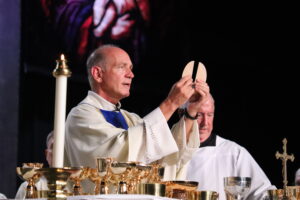
Bishop Mark Beckman celebrates the Liturgy of the Eucharist during his Mass of ordination and installation on July 26. (Photo Gabrielle Nolan)
“St. Paul preaches no other vision than that of Jesus Christ the Lord, the light that shines and gives guidance and direction. St. Paul is clear: this power is not rooted in himself but in God. St. Paul is only an imperfect vessel that can remind and show people the transcendent power of God. Like St. Paul, the bishop has a call to lead his people to a life of holiness, to live in imitation of Jesus Christ, and to be a community of believers who genuinely keep Jesus at the center of their lives. Sometimes, the dysfunction and brokenness of our world can tempt us to believe that such a life is not possible—it is simply too great of a goal for anyone to achieve.
“A bishop is to cast a vision of holiness for his people that shows them that it is possible to live in communion with Jesus. Not that the bishop himself does this perfectly—none of us are perfect, and we all fall daily. But it is often in our weakness and poverty when we accept, as St. Paul states, that we are earthen vessels that the treasure we hold can shine forth most brilliantly. Bishop Beckman, this wonderful diocese is ready for you when appropriate to lead them in this way—to cast your vision of where you believe God is calling this local Church to go and boldly lead them to that goal by your word and your way of life. Relying always on the grace of God, your example and leadership can bear great fruit for the flock entrusted to your care. Leading from the front allows a bishop to set an example, inspire action, and provide direction for others. By leading from the front, you give them an example to imitate: an example of preaching not yourself but Jesus Christ as the Lord of your life” the archbishop said.
The reading from the Gospel of John “gives us the final way a bishop leads his people: from the midst of them as a ‘Companion Shepherd,’” Archbishop Fabre noted.
“We hear of Jesus coming among His Apostles as they hid themselves, locked away in fear after Jesus’ crucifixion, death, and burial. The risen Jesus suddenly stood among them and spoke a word of peace and mercy. Jesus’ closeness to them—so close that He breathed on them—was a great grace to the Apostles, who did not know what to do next, who were weighed down by guilt, fear, and shame. Jesus gave them the grace of the Holy Spirit and the power to offer forgiveness. In like manner, Jesus comes close to us; He is among us, especially in the areas of our hearts we might prefer to keep hidden from Him, areas of our hearts that are locked away like the Apostles.
“Jesus’ closeness brings remarkable healing. In this way of leadership and shepherding, the bishop is called to be close to his people, be among them, and know them and their struggles. The bishop cannot simply remain aloof and disconnected from the flock, but rather, in imitation of the Good Shepherd, he must know the flock, and they must know him. Leading from the midst of your people requires a bishop to engage them actively, listen to their concerns, understand their perspectives, and work collaboratively towards shared goals. This approach can build trust, foster camaraderie, and create a sense of unity within the diocese.
“This closeness brings a sense of great peace and healing to people. Bishop Beckman, like Jesus with His Apostles in the upper room, you are called to be among the people and lead them from amidst them. To use the often-quoted adage from Pope Francis, you should be among them so that you take on the smell of the sheep. As you become a minister of mercy to them in the grace of reconciliation, you bring the presence of Christ close to the wounded parts of their hearts. As you come to know your flock, and as they come to know you, you will form a trust and closeness with them that will empower them to be sent out in the power of the Holy Spirit. This leading from within their midst as a Companion Shepherd will be a source of great grace for them and you,” Archbishop Fabre advised.
A bishop, therefore, “is always called to shepherd and lead his people,” the archbishop said.
“Bishop Beckman, God has chosen you to be the chief shepherd of this diocese,” he continued. “It might seem to you to be a daunting task, and indeed, it can and will be at times. But know that God never calls us to a mission without giving us the grace to accomplish that mission. Rely on God’s help, allow God to shepherd you, and with God’s constant help, guidance, and providence, God will be able to do great things through you and your leadership in the Diocese of Knoxville. May you be a good shepherd after the heart of Jesus Christ, the Good Shepherd, in all things, leading your people to eternal pastures. May God, who has already begun this good work in you, bring it to its completion. Amen.”
Promises of the elect
Following the homily, the rite continued with the promises of the elect.
Standing before Archbishop Fabre, Bishop-elect Beckman resolved to “carry out until death with the grace of the Holy Spirit the office entrusted to us by the Apostles and to be passed on to you through the laying on of hands”; “proclaim the Gospel of Christ faithfully and unfailingly”; “guard the deposit of faith pure and entire according to the tradition preserved always and everywhere in the Church from the time of the Apostles”; “build up the body of Christ, His Church, and to remain in her unity, with the Order of Bishops, under the authority of the successor of the blessed Apostle Peter”; “render obedience faithfully to the successor of the blessed Apostle Peter”; as a devoted father, “encourage the holy people of God and to guide them in the way of salvation together with the priests and deacons, your fellow ministers”; for the sake of the Lord’s name, “reach out in kindness and mercy to the poor, to strangers, and to all those in need”; as a good shepherd, “seek out the sheep who stray and gather them into the Lord’s fold”; and “pray without ceasing to almighty God for His holy people and carry out the office of high priest without reproach.”
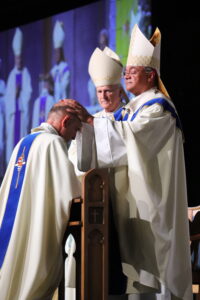
Archbishop Shelton J. Fabre, as principal consecrator, lays hands on Bishop Beckman as part of the Rite of Ordination of a Bishop. (Photo Gabrielle Nolan)
The bishop-elect responded “I do” to the first eight promises and “I do, with the help of God,” to the last one.
“May God, who has begun the good work in you, bring it to fulfillment,” Archbishop Fabre concluded.
Bishop-elect Beckman then prostrated himself before the altar for the Litany of the Saints, sung by the choir and the assembly.
Archbishop Fabre, followed by Bishop Spalding, Bishop Johnston, and the remaining bishops, then laid his hands upon the head of the bishop-elect.
The prayer of ordination followed as Bishop-elect Beckman knelt before Archbishop Fabre.
“Now pour forth upon this chosen one the power that is from You, the governing Spirit, whom You gave to Your beloved Son, Jesus Christ, and whom He gave to the holy Apostles, who established the Church in each place as Your sanctuary to the glory and unfailing praise of Your name,” the archbishop and the other bishops prayed.
Archbishop Fabre further said: “Grant, O Father, knower of all hearts, that this Your servant, whom You have chosen for the episcopate, may nourish Your holy flock and may without reproach exercise before You the high priesthood, serving You night and day; that he may unceasingly cause Your face to shine upon us and offer the gifts of Your holy Church. Grant that by the power of the Spirit of the high priesthood, he may have authority to forgive sins according to Your command; that he may apportion offices according to Your precept and loose every bond according to the authority You gave the Apostles; may he be pleasing to You in meekness and purity of heart, offering a sweet fragrance to You through Your Son, Jesus Christ, through whom glory and power and honor are Yours, with the Holy Spirit in the holy Church, both now and forever and ever.”
The archbishop anointed the head of the new bishop with sacred chrism as the latter knelt before him. Archbishop Fabre handed the Book of the Gospels to Bishop Beckman and placed the episcopal ring on Bishop Beckman’s right ring finger. The new bishop then received his miter and crosier.
Archbishop Fabre then formally installed Bishop Beckman by inviting him to be seated in his cathedra, or bishop’s chair, to tremendous applause from the faithful.
The Mass continued with the Liturgy of the Eucharist, with Bishop Beckman conducting that part of the service alone.
Numerous Communion stations were needed for the large gathering, with Knights of Columbus accompanying each extraordinary minister.
After Communion, Bishop Beckman reflected on his episcopal motto, “Jesus Christ yesterday, today, and forever.”
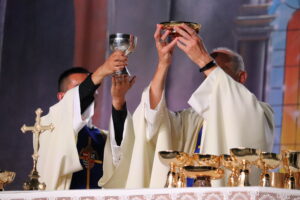
Bishop Mark Beckman, with assistance from Deacon A.J. Houston, elevates the Body and the Blood in the Liturgy of the Eucharist. (Photo Gabrielle Nolan)
“Those words are for me central. He is the purpose of our life, the reason why we do what we do,” he said. “The mystery of His presence here at this eucharistic table that fed us today gives us the nourishment to go out into the world as living witnesses of His unchanging love. I’m so grateful to be with all of you here today. This is a day of great beginnings, and it’s because of Jesus Christ that we’re here today. And it’s for Him that we live and for Him that we move.
“I want you now for just a moment, on this feast of Anne and Joachim, the grandparents of Jesus, to remember the people in your life who gave you the gift of faith by their example and love. My own grandparents—they were part of the reason that I’m here today, and all of us have been touched by someone of faith, or we wouldn’t be here today. So, we ask for the intercession of Anne and Joachim, that we will continue to witness in our own body of love the Good News of Jesus Christ, today and forever. Thank you, brothers and sisters. With God’s grace, let’s go forward.”
The choir then sang a hymn of praise, whose title was the same as the bishop’s motto.
Bishop Beckman gave a final blessing as the ordination Mass concluded.
“Give a happy outcome to the task that through your grace you have laid upon me, whom you have raised to the rank of bishop,” he said. “Make me pleasing to you in the fulfillment of my duties and so guide the hearts of people and pastor, that the obedience of the flock may never fail the shepherd or the care of the shepherd be lacking for the flock.”
Proud parents Jimmy and Lois Beckman of Lawrenceburg, Tenn., watched as their oldest child became bishop of Knoxville.
“It was beautiful, just overwhelmingly beautiful. We’re so blessed,” Mrs. Beckman said.
Her husband agreed.
“It’s the best Mass we’ve ever been to. It’s the best day, too, ever, and we’ve been married 62 years,” Mr. Beckman said.
Dozens of Beckman grandchildren, many just old enough to walk, smiled for the camera with Bishop Beckman after the ordination.
“We’ve got like 50 grandkids,” Mr. Beckman said.
“They’re all here, almost. I think two grandchildren didn’t make it, but everybody else was here,” Mrs. Beckman said.
Mrs. Beckman said her son is “all about the kids” in his extended family.
“He loves them, and they love him,” she said.
“Mark loves kids, and we do, too,” her husband agreed.
Mr. Beckman had an inkling that his son might become a bishop someday.
“I just thought about it, but I didn’t tell him that,” he said. “I thought about it a few years ago.”

